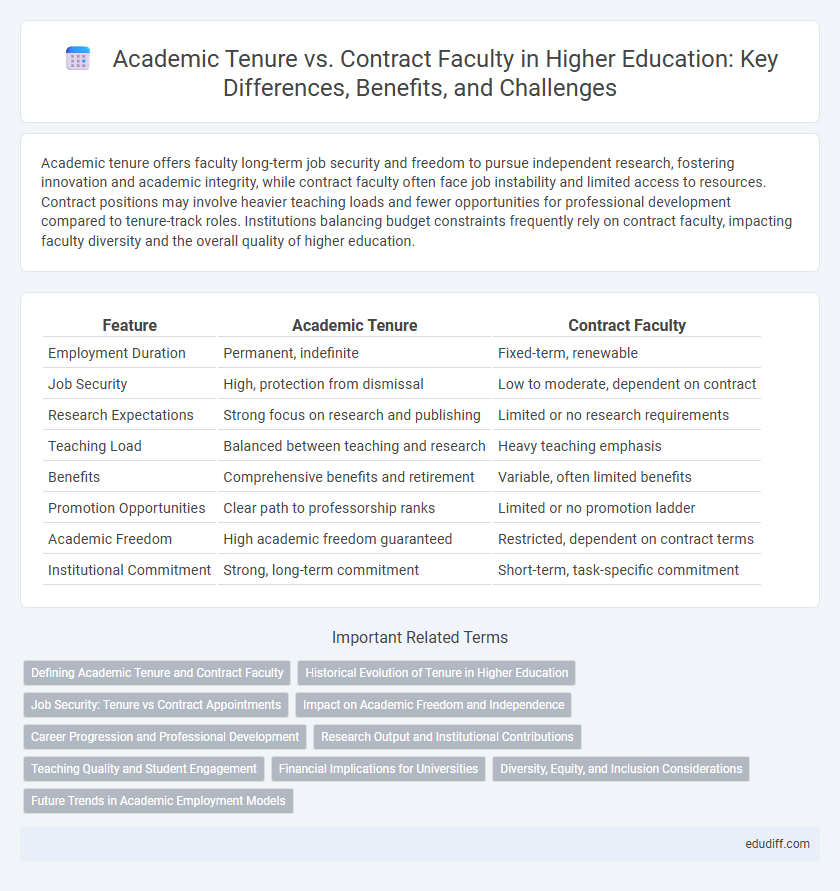Academic tenure offers faculty long-term job security and freedom to pursue independent research, fostering innovation and academic integrity, while contract faculty often face job instability and limited access to resources. Contract positions may involve heavier teaching loads and fewer opportunities for professional development compared to tenure-track roles. Institutions balancing budget constraints frequently rely on contract faculty, impacting faculty diversity and the overall quality of higher education.
Table of Comparison
| Feature | Academic Tenure | Contract Faculty |
|---|---|---|
| Employment Duration | Permanent, indefinite | Fixed-term, renewable |
| Job Security | High, protection from dismissal | Low to moderate, dependent on contract |
| Research Expectations | Strong focus on research and publishing | Limited or no research requirements |
| Teaching Load | Balanced between teaching and research | Heavy teaching emphasis |
| Benefits | Comprehensive benefits and retirement | Variable, often limited benefits |
| Promotion Opportunities | Clear path to professorship ranks | Limited or no promotion ladder |
| Academic Freedom | High academic freedom guaranteed | Restricted, dependent on contract terms |
| Institutional Commitment | Strong, long-term commitment | Short-term, task-specific commitment |
Defining Academic Tenure and Contract Faculty
Academic tenure provides faculty with long-term job security and protects academic freedom by granting a permanent appointment after a rigorous review process, usually involving research, teaching, and service evaluations. Contract faculty, often hired for fixed terms without the guarantee of renewal, typically focus on teaching responsibilities and may lack access to the same governance and professional development opportunities. The distinction between tenure and contract appointments significantly affects job stability, academic influence, and career progression within higher education institutions.
Historical Evolution of Tenure in Higher Education
Academic tenure in higher education evolved from medieval European university traditions, initially designed to protect scholars' intellectual freedom and job security. The formal adoption of tenure in American universities accelerated in the early 20th century, responding to rising concerns about academic freedom and institutional governance. Today, tenure remains a foundational concept distinguishing permanent faculty from contract-based appointments, reflecting historical commitments to academic independence and professional stability.
Job Security: Tenure vs Contract Appointments
Academic tenure offers long-term job security by providing faculty members with permanent employment and protection against arbitrary dismissal, whereas contract faculty appointments are typically time-limited and subject to non-renewal based on institutional needs or funding. Tenure-track professors benefit from institutional safeguards that support academic freedom and career stability, contrasting with contract faculty who often face employment uncertainty and limited job protection. The disparity in job security significantly influences faculty retention, professional development, and the overall academic workforce structure.
Impact on Academic Freedom and Independence
Academic tenure provides faculty with robust job security, fostering greater academic freedom to pursue innovative research and controversial topics without fear of dismissal. Contract faculty often face precarity that limits their independence, as temporary appointments can discourage risk-taking in scholarship and teaching. The disparity in employment status directly influences the capacity for intellectual autonomy and long-term scholarly contributions.
Career Progression and Professional Development
Academic tenure offers faculty long-term job security, promoting sustained research and teaching efforts, while contract faculty often face limited job stability, impacting career progression. Tenured professors typically access greater institutional resources and mentorship opportunities, facilitating advanced professional development and leadership roles. Contract faculty may encounter barriers to promotion and fewer opportunities for research funding, affecting their academic growth and career trajectory.
Research Output and Institutional Contributions
Academic tenure provides faculty with long-term job security that fosters sustained research output and deep institutional contributions, enabling scholars to pursue innovative, high-impact projects without immediate performance pressures. In contrast, contract faculty often face limited job durations and heavier teaching loads, which can restrict their research productivity and long-term engagement in institutional governance or curriculum development. Data from various universities indicate tenured faculty consistently produce higher citation-indexed publications and secure more research grants, strengthening the institution's research profile and academic reputation.
Teaching Quality and Student Engagement
Academic tenure often correlates with higher teaching quality due to job security fostering long-term investment in curriculum development and pedagogical strategies. Contract faculty, despite typically facing job instability, can enhance student engagement by bringing fresh perspectives and adaptive teaching methods responsive to current educational needs. Balancing tenure-track stability with contract faculty innovation is crucial for optimizing both teaching effectiveness and student learning experiences in higher education.
Financial Implications for Universities
Academic tenure provides financial stability for faculty but can result in long-term salary and benefit commitments that strain university budgets. Contract faculty offer more flexible staffing options with potentially lower short-term costs but may incur higher recruitment and training expenses due to turnover. Universities must balance these financial implications while maintaining academic quality and institutional stability.
Diversity, Equity, and Inclusion Considerations
Academic tenure offers long-term job security and promotes faculty autonomy, which can support diverse scholarly perspectives and inclusive pedagogies. Contract faculty often face job instability and limited institutional support, impacting their ability to contribute equitably to DEI initiatives. Institutions that invest in equitable support for both tenure and contract faculty foster a more inclusive academic environment.
Future Trends in Academic Employment Models
Future trends in academic employment models emphasize a shift toward more flexible contract faculty positions, driven by budget constraints and the demand for diverse expertise. The growth of non-tenure-track roles highlights institutions prioritizing adaptability, interdisciplinary collaboration, and performance-based evaluations. Emerging models integrate hybrid appointments combining tenure-track stability with contractual flexibility to balance academic freedom with fiscal responsibility.
Academic Tenure vs Contract Faculty Infographic

 edudiff.com
edudiff.com